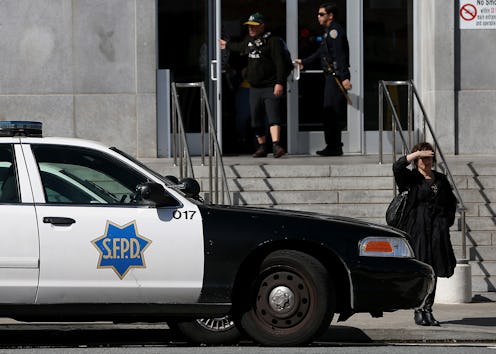Life
This App Will Respond To Mental Health Crises — So You Don’t Have To Involve The Police

In a mental health crisis, things can go wrong quickly. And considering police departments have been trying for years to figure out how to improve mental health response training for their officers, sometimes folks don't want to involve the police. That's where Concrn comes in. Concrn is an organization and first responder app for mental health crises intended to avoid police intervention by training and dispatching local community members to respond instead.
Concrn is both the name of the nonprofit behind the app and the app itself; the organization was founded in 2014, but the app (available for download from the Google Play Store) is fairly new, and currently offers services to San Francisco's Tenderloin neighborhood only. While plenty of apps get their start in the Tenderloin, which is located adjacent to Silicon Valley, there are other reasons the neighborhood is Concrn's epicenter.
For one, as TechCrunch reported, 80 percent of calls to the San Francisco Police Department are related to mental health. And considering that many Tenderloin residents struggle with poverty, and that the area is known for high crime rates, involving the police can end in violence, unaffordable ambulance rides, or even involuntary commitment, which can leave mentally ill people stuck with huge hospital bills.
With Concrn, folks who call to report a mental health crisis for themselves or others — including crises involving substance use disorder — will reach a seven-person lead responder team, many of whom are residents of the Tenderloin neighborhood itself.
Concrn's lead team is supported by a number of crisis volunteers. Whether a responder is paid or is a volunteer, they are required to attend a 20-hour training session, which covers conflict resolution, de-escalation training, and compassionate response, TechCrunch reported.
The organization specifies that it is a public service for non-emergency situations. If it is necessary to involve the police, a Concrn responder can escalate the situation and call 911, but responders' primary goal is to calmly defuse the situation without the presence of law enforcement.
Departments' and officers' problems with mental health crisis response have been well-documented in the last couple of years especially, as Black Lives Matter has drawn significant attention to how some police departments are ill-equipped to manage charged situations. Incidents like the January 2017 shooting of Sean Moore, a San Francisco resident with bipolar schizophrenia who was shot by police while unarmed, are grim indicators of the need for better training: Moore's neighbor allegedly called in a noise complaint, and when officers confronted Moore, their body cam footage revealed they "quickly [resorted] to aggressive behavior before attempting to pepper spray him, [hitting] him with a baton and shooting him twice," as 48 Hills reported. Moore survived the encounter, but the incident shows how important it is that officers be trained in how to react to disturbances involving a mentally ill person in crisis — if police need to intervene at all.
So far, Concrn has been handling an average of five to 10 calls per day, and not all of them come from the Tenderloin area. TechCrunch reported that the Concrn team coordinates with other mobile crisis units, as well as city agencies and service providers in San Francisco, to help spread compassionate care throughout the city.
Concrn's policy of providing care while minimizing police involvement isn't a new idea in mental health care; some support hotlines, like Trans Lifeline, already have policies in place to protect callers from having local authorities notified on their behalf when they're having a mental health crisis. In the case of Trans Lifeline, a volunteer can only call the police with a caller's "unprompted request and ongoing explicit consent."
But Concrn's aim to use its app to become a local, first-call, in-person response resource that everyone can call, including family, friends, and bystanders who see someone exhibiting potentially concerning behavior, and it's crucial that the idea spread. If someone spots a stranger acting "off," it's likely their first reaction is to call the police. A large-scale shift from calling 911 to contacting organizations like Concrn could cause a monumental change in the nature of mental health response.
Of course, something of that scale would require Concrn to be able to spread outside of San Francisco. As of right now, a human dispatcher handles inbound reports, according to TechCrunch, but a further-developed app, for which Concrn is trying to raise $250,000, would allow responders to connect directly with callers. On top of that, the organization "hopes to create a replicable playbook to distribute to other communities that experience similar issues," TechCrunch reported.
Concrn Co-executive Director Neil Shah told TechCrunch, "Our vision is one where through a combination of the community training and technology, we can build self-reliant communities that are best able to provide compassionate and humane care to those in need."
He added, "Our belief is that when community members, service providers, government agencies are all communicating and coordinating together through Concrn, we create a more effective path to resilience for vulnerable people in need of support."
Thinking of Concrn as just one piece of a larger puzzle which will build helpful networks for people with mental illnesses is essential. While Concrn's services can be groundbreaking, it's vital that people continue to demand better mental health treatment from officers, doctors, and government representatives who are frequently, directly involved in mental health situations and policymaking.
If you want to support Concrn's networking efforts, you can make a donation on the organization's website.